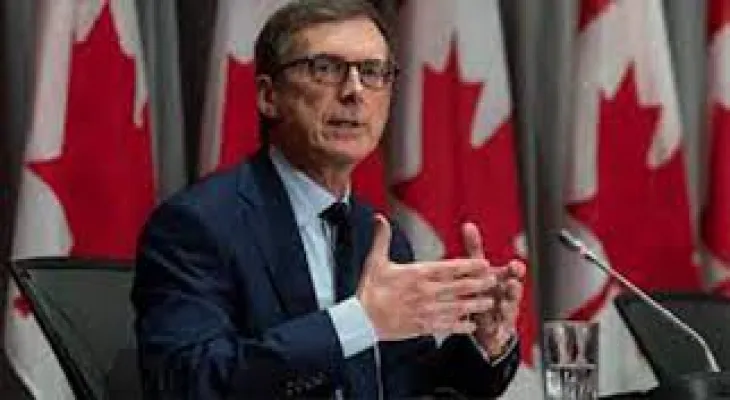Search here
Newspaper
Search here

Arab Canada News
News

Published: February 2, 2024
Bank of Canada Governor Tiff Macklem said the bank will not start cutting interest rates until it receives "confirmation" that inflation is trending toward its 2% target.
He added, "If inflation surprises on the upside, the bank will remain ready to raise interest rates further."
He made these comments while testifying before the House of Commons Standing Committee on Finance on Thursday.
He told committee members, "We don't want to wait until inflation returns to 2% before we start cutting interest rates." "Because if we do that, we will overshoot — we will reduce the inflation rate to below 2% and work to cool the economy more than necessary.”
He said the bank could begin cutting interest rates before headline inflation returns to 2% due to the lagging effects of monetary policy, emphasizing that what the bank does today can affect the economy for a year and a half into the future.
As of December, Statistics Canada reported that the country's core Consumer Price Index rose to 3.4%, up from 3.10% in November and the lowest level for 2023 at 2.8% last June.
"So yes, you want to start cutting interest rates before getting back there, but you don't want to cut them until you are convinced ... that you are really on the way to getting there, and that is really what we're at now."
Deliberations shift from the need to raise interest rates to the timing of cuts
Similar to comments made during a press conference following last week's interest rate decision, Macklem said monetary policy deliberations have now shifted from "whether monetary policy is sufficiently restrictive to when the current restrictive stance will be maintained."
Macklem said, "However, if 'new developments' continue to push inflation higher, the bank will not hesitate to raise interest rates further."
Currently, he said this is less likely as supply and demand pressures have eased, and corporate pricing behavior is continuing to return to normal.
He affirmed that the bank is closely monitoring core inflationary pressures and still wants to see further ongoing easing of core inflation, which excludes volatile items such as food and energy.
Shelter inflation cannot be ignored
On this front, Macklem acknowledged that housing inflation remains a major upward contributor to overall inflation.
However, he warned against calls from some who say inflation would be near its neutral target if housing inflation were not taken into account, and they argue that shelter costs should be excluded because they are temporarily affected by the central bank’s interest rate increases.
"First and foremost, Canadians pay shelter costs." He said, "It is a real cost and we cannot ignore it."
But Macklem also said that if you remove shelter costs, you would also have to remove some "unusually weak" items that weigh down inflation on the downside.
He told the committee, "If you used a more regular approach to exclude unusual highs and unusual lows, inflation appears to be about 3.5%." "What this tells you is that the distribution center remains above 3%."
Interest rates will not solve supply shortages
The governor also responded to MPs' questions about how the bank’s interest rate hikes have made the housing supply challenge worse by making some construction projects unfeasible due to higher borrowing costs.
Macklem said while the high rates have had an impact on the housing sector, he pointed out that the bigger impact has been on the demand side.
He added, "There is an impact on the supply side, and developers have pointed that out, but by raising the interest rate, we reduce demand and thus the economy is now more balanced."
However, New Democratic Party MP Daniel Blaikie responded to the governor by saying that although there may currently be fewer people bidding on homes, the fundamental demand for housing remains because housing demand equals the number of people who need a place to live.
He said, "While demand on paper has declined, the number of people in Canada who need a place to live has not."
Macklem was also asked whether the Bank of Canada has explored other tools that could increase the housing supply, but he replied by telling MPs the authority lies with them.
"That is up to you to decide." He said, "Governments can implement measures, taxes, grants, and other budgetary measures that can target different sectors of the economy."
He encouraged all levels of government – municipal, provincial, and federal – to work together to “use different mechanisms” to reduce the housing supply shortage, adding that it “will take some time.”
He added, "The lasting solution is to increase supply, which includes the supply of homes and the supply of purpose-built rentals." "That is something the government needs to think about."
Comments